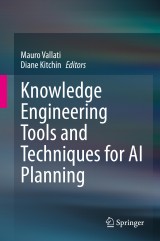Details

Knowledge Engineering Tools and Techniques for AI Planning
|
160,49 € |
|
| Verlag: | Springer |
| Format: | |
| Veröffentl.: | 25.03.2020 |
| ISBN/EAN: | 9783030385613 |
| Sprache: | englisch |
Dieses eBook enthält ein Wasserzeichen.
Beschreibungen
<div><div><div>This book presents a comprehensive review for Knowledge Engineering tools and techniques that can be used in Artificial Intelligence Planning and Scheduling. KE tools can be used to aid in the acquisition of knowledge and in the construction of domain models, which this book will illustrate. </div><div><br></div><div>AI planning engines require a domain model which captures knowledge about how a particular domain works - e.g. the objects it contains and the available actions that can be used. However, encoding a planning domain model is not a straightforward task - a domain expert may be needed for their insight into the domain but this information must then be encoded in a suitable representation language. The development of such domain models is both time-consuming and error-prone. Due to these challenges, researchers have developed a number of automated tools and techniques to aid in the capture and representation of knowledge.</div><div><br></div><div>This booktargets researchers and professionals working in knowledge engineering, artificial intelligence and software engineering. Advanced-level students studying AI will also be interested in this book.</div></div></div>
Preface.- Part I: Knowledge Capture and Encoding.- 1. Explanation-based Learning of Action Models.- 2. Automated Domain Model Encoding tools for Planning.- 3. A Formal Knowledge Engineering Approach for Planning and Scheduling: Applications with itSIMPLE.- 4. MyPDDL: Tools for efficiently creating PDDL domains and problems.- 5. Planning.Domains: A Tool Suite for the Planning Researcher.- 6. Modelling Planning Tasks: Representation Matters.- Part II: Interaction, Visualisation, and Explanation.- 7. An Interactive Tool for Plan Generation, Inspection and Visualization.- 8. Interactive Visualization in Planning and Scheduling.- 9. Argument-based Plan Explanation.- 10. Interactive Planning-based Hypothesis Generation with LTS++.- 11. Web Planner: A Tool to Develop, Visualize and Test Classical Planning Domains.- Part III: Case Studies and Applications.- 12. Design of Timeline-based Planning Systems for Safe Human-Robot Collaboration.- 13. Planning in a Real-world Application: An AUV Case Study.- 14. Knowledge Engineering and Planning for Social Human-Robot Interaction: A Case Study.-
<div><div><b>Dr Diane Kitchin</b> has worked as a Senior Lecturer in the Department of Computer Science at the University of Huddersfield since 2000. Her main research focuses on the area of AI Planning and Knowledge Engineering. She has published papers on Object-Centred Planning, Tools for AI, Portfolio-based planning and Domain model acquisition in a number of conference proceedings. Work on Planning Domain Definition appeared in the Journal of Knowledge Engineering, with further journal publications in the International Journal on Artificial Intelligence Tools, The Knowledge Engineering Review and AI Communications.</div><div><br></div><div><b>Dr Mauro Vallati</b> is a Senior Lecturer in the Department of Computer Science at the University of Huddersfield. He has extensive experience in real-world applications of AI methods and techniques, with his research focusing on the Knowledge Engineering aspects of AI applications. Among the others, he investigated the useof AI for managing urban traffic control, for controlling robots, and for reducing the energy consumption of manufacturing machine tools. Dr. Vallati has published a significant number of papers in top AI venues, and has co-organised important events for the AI field, such as workshops, competitions, and conferences. He delivered numerous tutorials in important AI venues.</div></div>
<div>This book presents a comprehensive review for Knowledge Engineering tools and techniques that can be used in Artificial Intelligence Planning and Scheduling. KE tools can be used to aid in the acquisition of knowledge and in the construction of domain models, which this book will illustrate. </div><div><br></div><div>AI planning engines require a domain model which captures knowledge about how a particular domain works - e.g. the objects it contains and the available actions that can be used. However, encoding a planning domain model is not a straightforward task - a domain expert may be needed for their insight into the domain but this information must then be encoded in a suitable representation language. The development of such domain models is both time-consuming and error-prone. Due to these challenges, researchers have developed a number of automated tools and techniques to aid in the capture and representation of knowledge.</div><div><br></div><div>This book targets researchers and professionals working in knowledge engineering, artificial intelligence and software engineering. Advanced-level students studying AI will also be interested in this book.</div>
There is no up-to-date book which covers this topic area, only a few scattered research/conference papers which address this topic Chapters writen by International leaders from both industry and academia working in this field Discusses Transport Visualisation tool for PDDL Planning

















